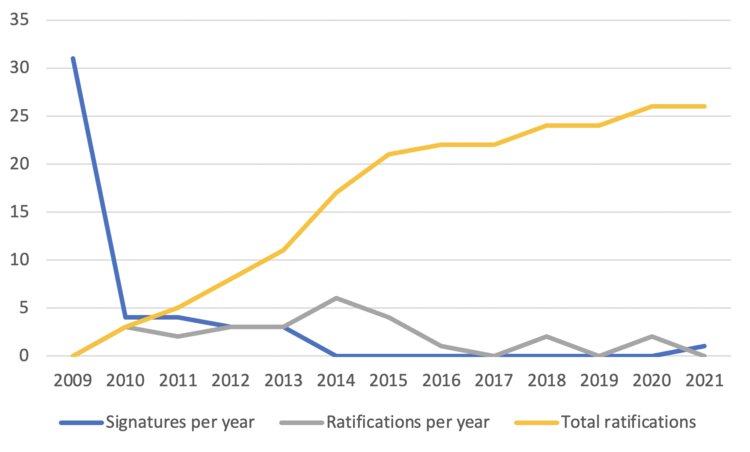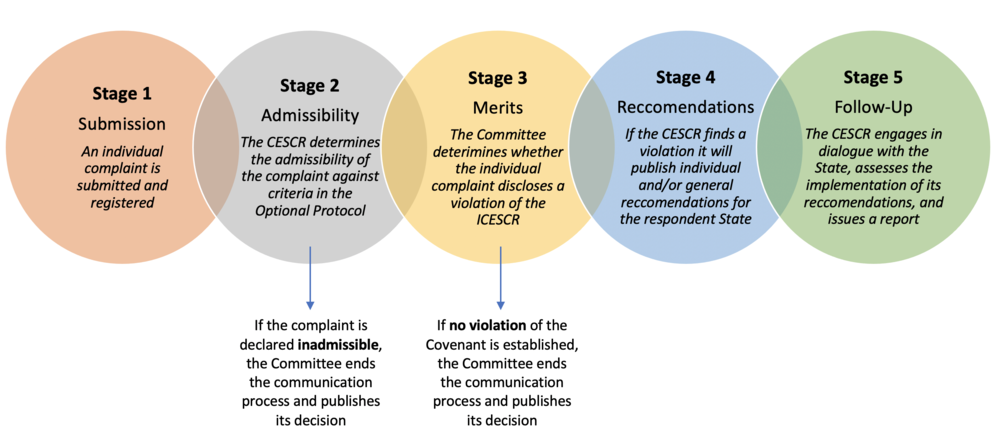Individual Communication Guide
The Committee for Economic, Social and Cultural Rights (CESCR) may consider complaints brought by individuals who allege that their ICESCR rights have been violated. Specifically, the Committee is empowered to consider claims that a State Party to the Optional Protocol to the International Covenant on Economic, Social and Cultural Rights (OP-ICESCR) has violated one of the human rights contained in the International Covenant on Economic, Social and Cultural Rights (ICESCR).
On this page you can find:
- Information on the Optional Protocol to the International Covenant on Economic, Social and Cultural Rights
- A step-by-step guide to the different stages of the individual communication process
- A collection of additional resources where further information can be found
The page was last updated on 26th April 2021.
THE OPTIONAL PROTOCOL
The Optional Protocol to the International Covenant on Economic, Social and Cultural Rights entered into force on the 5th May 2013. The treaty empowers the CESCR to receive and consider complaints, known as “communications”.
The OP-ICESCR currently has 46 signatories and 26 parties, a list of which may be accessed here.
The most recent ratification was that of the Maldives, on the 23rd December 2020. The most recent signature was that of Cyprus, on 29 January 2021.

Optional Protocol to the ICESCR signatures and ratifications (including accessions)
STEP-BY-STEP GUIDE TO THE INDIVIDUAL COMPLAINTS PROCEDURE

The Individual Communication process begins with the submission of a complaint (or ‘petition’) to the Committee.
Complaints are to be submitted to the Petitions and Inquiries Section of the Office of the High Commissioner for Human Rights. They do not have to be submitted by lawyers and the Committee explicitly strives to take a “victim-centred approach” and “refrain from imposing any unnecessary formalities”. The Committee has recently published a new individual complaints form, as well as guidance on the process of submitting an individual communication. Both may be accessed below:
Upon receipt, the Petitions and Inquiries Section will register a complaint. Complaints will occasionally not be registered, for example if they are directed at a State that is not a party to the Optional Protocol.
When submitting a complaint it is possible to ask the Committee to issue a request that the State party concerned take interim measures. Similar to an injunction, the purpose of interim measures is “to avoid possible irreparable damage to the victim or victims of the alleged violations” before the Committee has considered the communication (article 5 OP-ICESCR). If a State party does not follow a request from the Committee to take interim measures, it will be in violation of article 5 of the Optional Protocol. It should be stressed, however, that a Committee’s decision to request interim measures “does not imply a determination on admissibility or on the merits of the communication”. Consult the Committee’s guidelines on interim measures for further detail.
In accordance with article 8 (1) of the Optional Protocol, the Committee may also accept third party submissions (amicus curiae briefs). The Committee’s guidance on third-party interventions may be accessed here.
ADDITIONAL RESOURCES
In 2020, Sandra Liebenberg, a former member of the Committee, published an article entitled “Between Sovereignty and Accountability: The Emerging Jurisprudence of the United Nations Committee on Economic, Social and Cultural Rights under the Optional Protocol.” The article is highly recommended, particularly on account of its close analysis of the approach that the Committee has followed when considering both the admissibility and the merits of communications. It may be accessed here.
In 2016 “The Optional Protocol to the International Covenant on Economic, Social and Cultural Rights: A Commentary” was published by Pretoria University Law Press (PULP). The commentary was edited by Malcolm Langford, Bruce Porter, Rebecca Brown & Julieta Rossi and has been made available in full. it includes the following chapters:
-
Malcolm Langford, Bruce Porter, Rebecca Brown & Julieta Rossi
Introduction -
Catarina de Albuquerque and Malcolm Langford
The Origins of the Optional Protocol
-
Christian Courtis and Julieta Rossi
Individual Complaints Procedure
-
Donna J. Sullivan
The Inquiry Procedure
-
Malcolm Langford, Cheryl Lorens and Natasha Telson
Inter-State Procedure
-
Bruce Porter
Reasonableness and Article 8(4)
-
Malcolm Langford
Substantive Obligations
-
Rebecca Brown, Lilian Chenwi and Michael Ashley Stein
Equality and Non-Discrimination
-
Viviana Krsticevic and Brian Griffey
Interim Measures
-
Viviana Krsticevic and Brian Griffey
Remedial Recommendations
-
Başak Çalı
Enforcement
The Geneva Academy of International Humanitarian Law and Human Rights has also produced a briefing paper on the Optional Protocol to the International Covenant on Economic, Social and Cultural Rights (2013). It may be accessed here.
On the drafting of the Optional Protocol, see Claire Mahon, Progress at the Front: The Draft Optional Protocol to the International Covenant on Economic, Social and Cultural Rights, 8 HUM. RTS. l. Rev. 617 (2008). Accessible here.
For detail on the history of the debate concerning an Optional Protocol to the ICESCR, see Catarina de Albuquerque, Chronicle of an Announced Birth: The Coming into Life of the Optional Protocol to the International Covenant on Economic, Social and Cultural Rights: The Missing Piece of the International Bill of Human Rights, 32 HUM. RTS. Q. 144 (2010). Accessible here.
In 2009 the Nordic Journal of Human Rights produced a special issue (Volume 27, No: 1) in which they published eight articles on the Optional Protocol, all of which may be accessed here. The eight articles include:
-
Malcolm Langford
Closing the Gap? An Introduction to the Optional Protocol to the International Covenant on Economic, Social and Cultural Rights -
Pius Langa
Taking Dignity Seriously. Judicial Reflections on the Optional Protocol to the ICESCR -
Bruce Porter
The Reasonableness of Article 8(4). Adjudicating Claims from the Margins -
Christian Courtis and Magdalena Sepúlveda
Are Extra-Territorial Obligations Reviewable under the Optional Protocol to the ICESCR? -
Beth A. Simmons
Should States Ratify? Process and Consequences of the Optional Protocol to the ICESCR -
Stein Evju
Should Norway Ratify the Optional Protocol to the ICESCR? That is the Question -
Inge Lorange Backer
Ideals and Implementation: Ratifying Another Complaints Procedure? -
Martin Scheinin and Malcolm Langford
Evolution or Revolution? Extrapolating from the Experience of the Human Rights Committee

